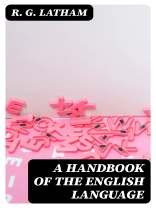R. G. Latham’s 'A Handbook of the English Language’ serves as a compelling and comprehensive exploration of the intricacies of English linguistics, delving into phonetics, syntax, and semantics. With meticulous attention to detail and a clear, accessible prose style, Latham positions this work within the context of 19th-century linguistic scholarship, drawing on classical education while engaging in the burgeoning field of philology. His structured approach adeptly combines theoretical insight with practical guidance, catering not only to scholars but also to students and language enthusiasts seeking to deepen their understanding of English. R. G. Latham, a distinguished linguist and philologist, was notably influenced by his background in classical studies and his engagement with contemporary language theorists. His scholarly pursuits were driven by a fascination with the evolution of language and a commitment to preserving the richness of English. This handbook is a product of his desire to bridge the gap between traditional linguistic scholarship and modern pedagogical needs, reflecting his belief in the importance of language as a living, evolving entity. This authoritative guide is highly recommended for anyone interested in the foundational aspects of the English language. Whether you’re a student, educator, or passionate linguist, Latham’s insights will enrich your comprehension and appreciation of English. Engaging with this handbook will not only enhance your linguistic knowledge but also inspire a deeper curiosity about the language’s dynamic nature.
O autorze
Robert Gordon Latham (1812–1888) was an eminent English philologist, ethnologist, and physician, renowned for his scholarly contributions to the study of language. Latham’s literary achievements include the esteemed work 'A Handbook of the English Language’ (1852), in which he rigorously analyzed the origins, structure, and evolutions of the English language. His writing style combines academic precision with a passion for etymology and syntax, offering an insightful exploration suitable for students and scholars alike. As an educator, Latham served as professor of English language and literature at University College, London, where he influenced a generation of linguists with his groundbreaking theories.
A testament to his dedication to language studies, Latham’s handbook was a quintessential text for those studying English in the nineteenth century, laying the groundwork for future linguistic research. The book delineated the key aspects of historical and comparative linguistics and offered a thorough examination of phonology, grammar, and semantic changes over time. With a medical background, Latham brought an analytical eye to his literary endeavors, exemplified in his methodical approach to dissecting language components. His work in philology stands as a cornerstone of the field, reflecting the scholastic vigor of the Victorian era’s approach to the study of English.












